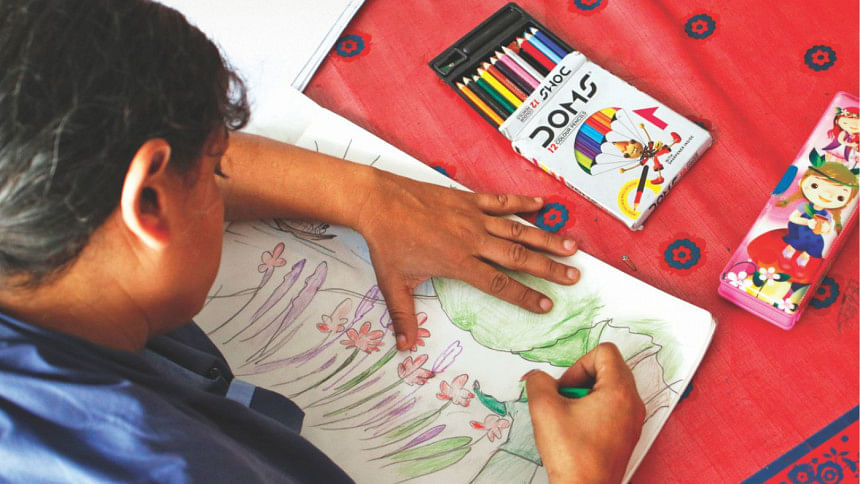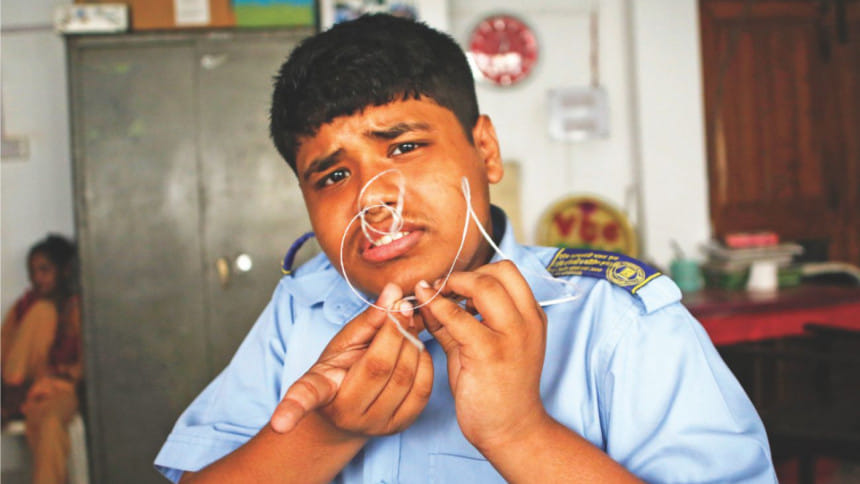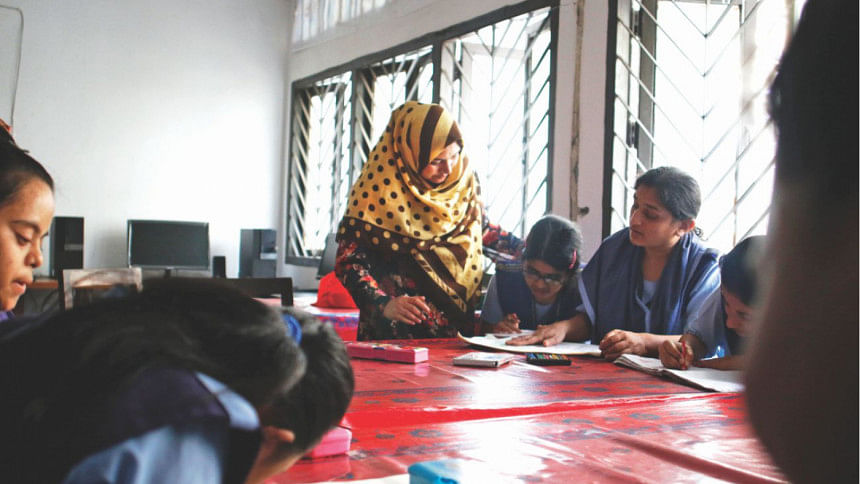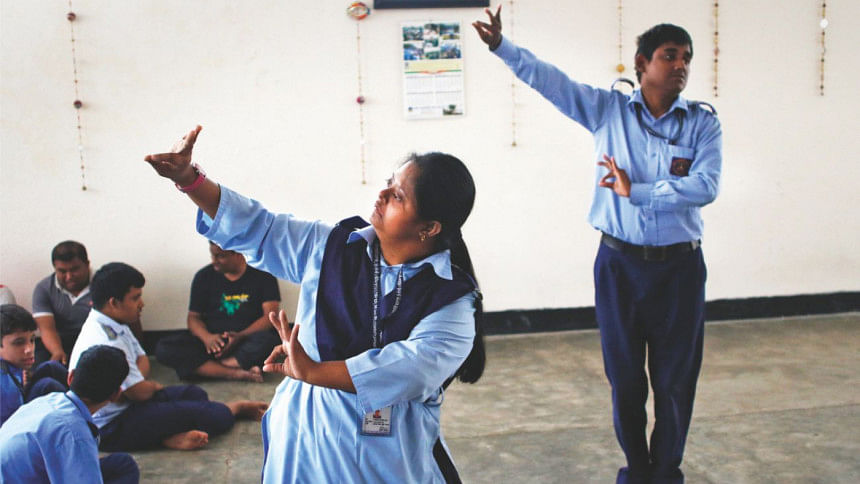The special disadvantage of special needs

"Which university do you want to go to?” I wrote down on a notebook. She circled the word “university” and weakly asked in a shaky voice that barely rose above a whisper: “What does this word mean?”
Maisha will be graduating tenth grade in less than a year from a reputable institution in the city, but her performance at school lags behind her peers'—as can be seen from the absence of the word “university” from her vocabulary. This is however through no fault of hers. Maisha was born with a handicap—she cannot hear, and is diagnosed as clinically hearing-impaired. Her schoolmates are all able-bodied children and she has to compete with them. Every time a teacher turns her back to Maisha, or turns her face away from her while talking, the child's engagement in the lesson ceases. She misses out on important lesson elements that her peers do not.
“I can lip-read if you speak slowly,” she explains. This correspondent could not always find the correct pace at which Maisha could understand what was being said, proving just how difficult it is to communicate with her. Her teachers too need to repeat each sentence to her.
Maisha is one of the thousands of disabled children who go to mainstream schools because of inadequate educational services for children with special needs. Mainstream schools, on the other hand, either do not take the initiative to equip themselves with the specialists needed to cater to students like Maisha, or are too resource-strapped to do so.
The school
Take Maisha's school for example—a school that is registered under the board, but with teachers who are not employed by the government. Colloquially, the school is known as non-MPO (Monthly Pay Order) in reference to the fact that the teachers receive their paycheck from the institution itself, not the state. Located in Lalmatia, the school is small, with class sizes of 20 or 30 students, at best, in each grade.
This cash-strapped school has Maisha along with three children with varying degrees of autism. To cater to all these children, this small institution would need two or three types of therapists or specialist teachers.
To add fuel to fire, the government has outlawed schools from rejecting admission to any children based on their disabilities. As per the Rights and Protection of Persons with Disabilities Act 2013, parents can complain against schools refusing admission to children based on their disabilities. The complaint can result in action being taken against the principal of the school. This backfires when the schools themselves are not equipped to take care of these children.

This is exactly what Maisha has been facing from the time she stepped into nursery school, says her mother. “We put her in a private school in Dhanmondi, but that did not work out too well because she was lagging behind the other students and it was affecting her,” adds Naznin Akter. Maisha was a child trying to learn her ABCs in an environment where nobody knew sign language or how to teach a child like her.
After completing kindergarten at the school, her mother shifted Maisha to one of the only two well-known schools for hearing-impaired children in the city. “She was in second grade by then,” says the mother. The girl had essentially spent the early years of her life self-teaching herself how to lip-read.
“She learnt sign language and stopped talking completely when she went to the school. We did not like that development. I wanted her to be able to fully communicate with everyone else,” says Naznin. So she was shifted back to a mainstream school—the one she is in now.
“I feel as if the barriers she has to face while learning has put her off education quite a bit,” adds Naznin. “She does not do well in school and she has always liked drawing and painting better than studying anyway.”
Maisha too wants to be an art teacher for children when she grows up.
These teachers, none of whom have degrees in special needs education, have to step in and do their best.
The teacher
With a high-functioning autistic boy in her sixth-grade class, the English teacher of Maisha's school devotes extra time and care.
She makes the rounds around the class, mildly snapping at a few giggling boys who forgot to bring their textbooks, but when she comes to this student her tone changes. “How are you doing today? Can I take a look at your bag and see if you have this book?” she coos. His first task is to pick out the right textbook for the class, and she stands by as he takes time to figure it out, all the while gushing words of encouragement. The rest of the class watches.
Meanwhile, for every bit of lesson learnt, for every new word introduced, the teacher takes a few minutes off to give the boy individual attention. She sets them all a class task of answering five questions based on a passage in English—and then beams with pride when the boy manages to answer one during the entire duration of the class time.
“He is quiet and receives basic instructions, so we can work with him. We had another child in a junior class whose handicap was that he used to get very violent. He used to hit the other children in his class and when it kept happening several times we could not keep him,” says the teacher. That was his only drawback, albeit an important one—that he got upset and physically hurt others. The school does not have someone medically equipped and certified to deal with a special needs child who has violent tendencies.

Autism expert Dr Leedy Hoque says that high-functioning children with intellectual handicaps can be incorporated into mainstream schools but they need to be retrofitted with therapists.
“No two autistic children are alike. Depending on the kind of autism, the child may need speech therapy, occupational therapy or physiotherapy,” she explains.
The student
This is why Nazia Afrin's four-year-old son Anush was turned away from school after school in a clear violation of the government directive.
“Anush's doctor said that he is high-functioning in spite of his autism and needs to be put in a mainstream school for better development,” says Nazia, who works as a news editor at a private television channel.
This proved easier said than done. “The first school I went to is known for being receptive towards children with special needs but they were anything but,” claims Nazia. “Anush's condition makes him very hyperactive. He was running around and playing, refusing to sit which the teachers did not take kindly to.” They refused him admission.
In an effort to make a good impression on the teachers, Nazia kept trying to strain Anush and force him to sit down, making it an unpleasant experience for him overall. “He was angry and upset after the experience at school. When we tried to take him to the next school he threw a tantrum and refused,” describes Nazia.
The confusing experience at school resulted in Anush hitting a child when he went to the next one. The teachers flatly told Nazia that Anush would not be accepted there. “They even asked how Anush would develop with me being a working mother,” she claims. Both the mother and the son felt misjudged and upset.
The child now goes to a school in Lalmatia where almost all his peers are special needs children. “This school has specialists who know how to take care of kids like Anush. But almost all of his classmates have more serious conditions of autism than him. As a result, my son has not yet developed the social skills needed to talk to children or play with children,” she explains.

Nazia harbours doubts about whether the school will be able to help Anush develop at the pace he should be developing.
The director of Society for Welfare of the Intellectually Disabled (SWID) Nurul Islam explains how they deal with children with varying degrees of capabilities in their classrooms. “It is all about individual attention. Every student has to have an individual lesson plan,” he explains.
There are 62 upazila-level special needs schools established by the government all over the country. In many places, unlike the city centre, schools are in remote places. A 2014 UNICEF report titled “Situation Analysis of Children with Disabilities in Bangladesh” states: “The majority of government-supported programmes cater to children with physical, visual and hearing impairments and serve close to 10,000 students. Special education services for children with autism or intellectual impairments are primarily being provided by JPUF [Jatiyo Protibondhi Unnayan Foundation], NGOs and private organisations.” In situations like this, where there are not enough facilities at the district level, the government directive that bars schools from refusing admission to special needs kids makes sense.
But the report also states: “[…]it should be acknowledged that fewer children with disabilities need special education or specialised services. The majority can be included in the mainstream school system when teachers have the right training.”
In light of this, should government efforts to include children with disabilities in mainstream schools also come hand-in-hand with initiatives that ensure that they are actually cared for?

 For all latest news, follow The Daily Star's Google News channel.
For all latest news, follow The Daily Star's Google News channel. 



Comments